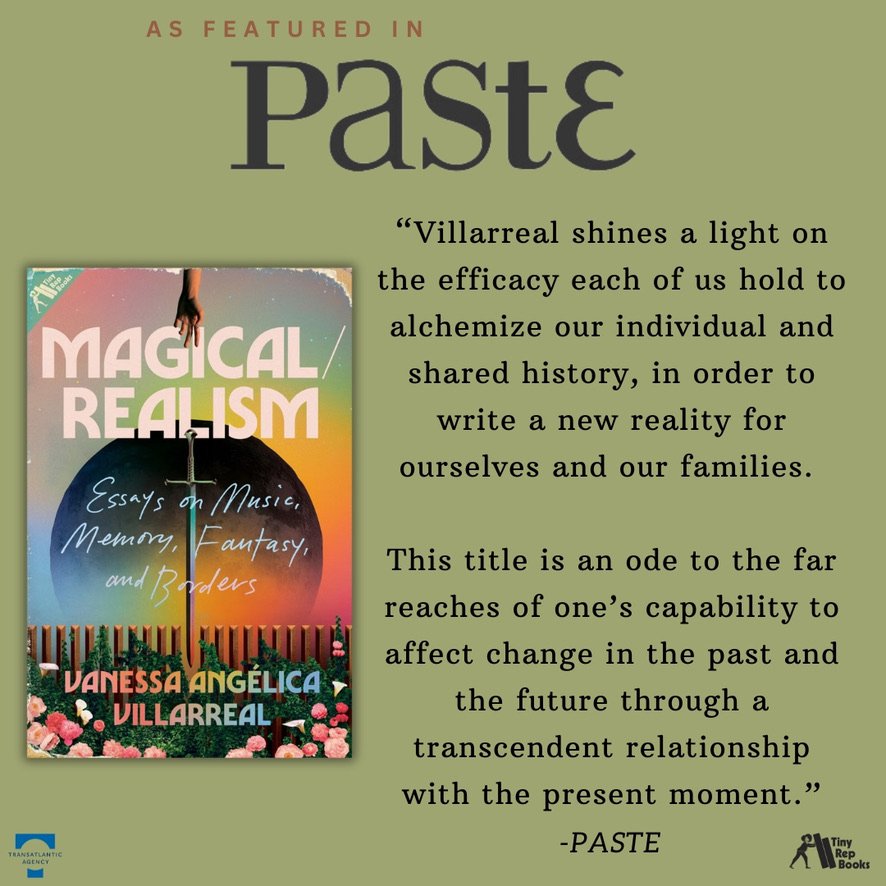Vanessa Angélica Villarreal collaged with botanical illustrations, 2022.
NEWS
Magical/Realism has been named a finalist in the Reading the West Book Awards in Memoir/Biography! Vote by 5/30/25 at the link!
Magical/Realism longlisted for the National Book Award in Nonfiction, National Book Critics Circle Award in Criticism, and the Golden Poppy Awards in Nonfiction (CALIBA)!
Magical/Realism named Best Book of 2024 at Kirkus, NPR, PASTE Magazine, ELLE Magazine, HIPLatina, Reader’s Digest, and Book Riot! (all linked)
UPCOMING 2025 EVENTS: Washington University in St. Louis (2/18), Children of Cuarón Conference at Dartmouth with Carmen Maria Machado (2/20-23), NBF Presents x Mississippi with Hanif Abdurraqib at Coahuma Community College and University of Mississippi's Center for the Study of Southern Culture (4/2-4/3), and San Antonio Book Festival (4/12-4/13)
OFFICIAL BIO
Vanessa Angélica Villarreal is the author of the essay collection Magical/Realism: Essays on Music, Memory, Fantasy, and Borders (Tiny Reparations Books, 2024), longlisted for the National Book Award and National Book Critics Circle Award, and the poetry collection Beast Meridian (Noemi Press, 2017), recipient of a 2019 Whiting Award, a Kate Tufts Discovery Award nomination, and winner of the John A. Robertson Award for Best First Book of Poetry from the Texas Institute of Letters. Her work has appeared in the New York Times, New York Magazine’s The Cut, Harper’s Bazaar, Oxford American, Paris Review, Poetry Magazine, and elsewhere. She is a recipient of a 2021 National Endowment for the Arts Fellowship, and holds a doctorate in English Literature and Creative Writing from the University of Southern California in Los Angeles, where she lives with her son and a loyal dog. Find her on Twitter @Vanessid.
ABOUT
Vanessa Angélica Villarreal is a poet, essayist, and first-generation Mexican-American born in the Rio Grande Valley and raised in Houston, Texas. Formerly labeled an at-risk youth and expelled from the Texas public school system, she is the first in her family to graduate high school, the first to attend college, and the first to graduate with an advanced degree. She earned her MFA from the University of Colorado at Boulder, and a doctorate in English Literature and Creative Writing at the University of Southern California in Los Angeles, where she lives with her son and her black shelter shepherd, Rumi. Her areas of study are decolonial and critical race theory, memory studies, Black and indigenous ecologies, affect theory, queer phenomenology, popular culture and media studies, speculative nonfiction, critical fabulation, visual and documentary poetics, and transnational/transborder feminisms, engaging discourses on borders and the affective geographies of memory and fantasy. Read more about her work below.
ARTIST’S STATEMENT
The central objective of my work is to recover memory from the absences and silences of migration, colonial erasure, and violence. I’m interested in what can be found, re-animated, and restored in materials, documents, archives, and objects, and how poetic language can reinscribe the fragments of survivor-memory back into the archive.
My grandmother Angélica is a central figure in my work. As the eldest daughter of cotton laborers in Mexico del Norte, she endured an extraordinarily brutal, unrecorded life that ended as an undocumented, experimental cancer patient at 50 years old. Her life, and early death, are the consequence of state, institutional, and intimate violence, where race, gender, immigration, and class all played a role in creating her unsurvivable circumstances. Her survival, strength, and resilience are gifts I have inherited that I now honor through my writing.
The absence of records and memory of my family history drives my academic and scholarly research on postcolonial memory loss, intimate colonialism, the archive, and transnational feminisms, with a special focus on state, medical, institutional, and intimate violence against women of color in the United States.
My first book, Beast Meridian, explores first-generation, queer immigrant daughterhood in the borderlands, and reframes the speaker’s struggles with institutional, domestic, and racialized violence through persona poems written in the voice of ancestral animals in the imaginative landscapes of their afterlives.
My essay collection, Magical/Realism: Essays on Music, Memory, Fantasy, and Borders, published in 2024 with Tiny Reparations Books, an imprint of Penguin Random House, is a collection of essays and autotheory on the affective borders between the U.S. and Mexico, and how fantasy and popular culture makes erased memory legible, explored through critical essays on music, film, television, and video games.
In poetry, I am continuing the archival and visual project of a documentary poetics manuscript that investigates the process of seeking one’s history in the absence of documents, using illustrations and fragments to reproduce the state of dispossession, temporal dislocation, and postcolonial memory loss, and reinscribe forgotten histories back into the record.



